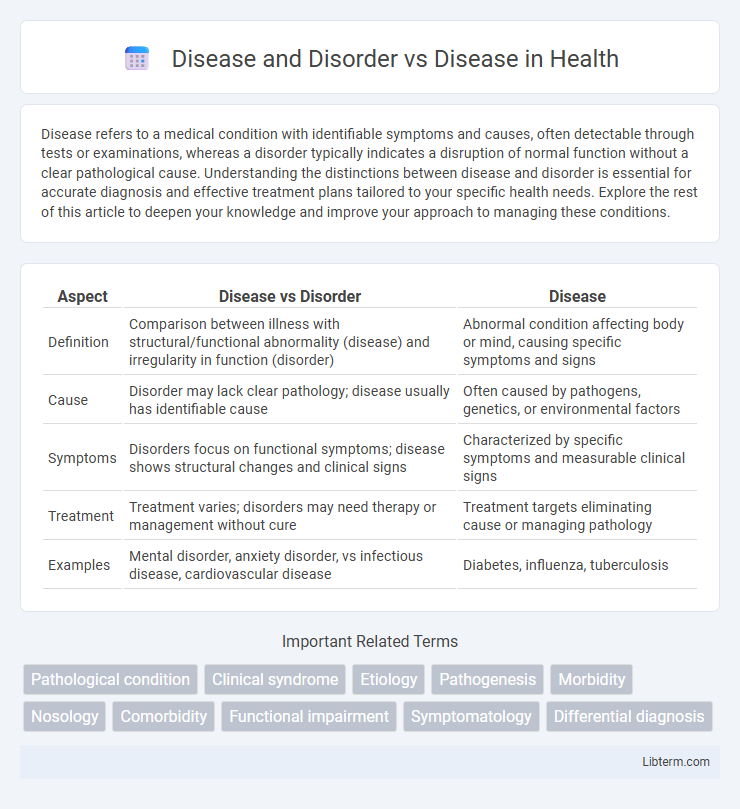Disease refers to a medical condition with identifiable symptoms and causes, often detectable through tests or examinations, whereas a disorder typically indicates a disruption of normal function without a clear pathological cause. Understanding the distinctions between disease and disorder is essential for accurate diagnosis and effective treatment plans tailored to your specific health needs. Explore the rest of this article to deepen your knowledge and improve your approach to managing these conditions.
Table of Comparison
| Aspect | Disease vs Disorder | Disease |
|---|---|---|
| Definition | Comparison between illness with structural/functional abnormality (disease) and irregularity in function (disorder) | Abnormal condition affecting body or mind, causing specific symptoms and signs |
| Cause | Disorder may lack clear pathology; disease usually has identifiable cause | Often caused by pathogens, genetics, or environmental factors |
| Symptoms | Disorders focus on functional symptoms; disease shows structural changes and clinical signs | Characterized by specific symptoms and measurable clinical signs |
| Treatment | Treatment varies; disorders may need therapy or management without cure | Treatment targets eliminating cause or managing pathology |
| Examples | Mental disorder, anxiety disorder, vs infectious disease, cardiovascular disease | Diabetes, influenza, tuberculosis |
Understanding Disease: A Comprehensive Overview
Disease refers to a specific pathological condition characterized by identifiable signs and symptoms, often caused by infections, genetics, or environmental factors, while disorder encompasses a broader range of abnormalities or dysfunctions that may not always have a clear pathological basis. Understanding disease involves studying etiology, pathophysiology, clinical manifestations, and diagnostic criteria to identify and manage specific illnesses effectively. Comprehensive knowledge of disease supports targeted treatment strategies and improved patient outcomes in medical practice.
What Defines a Disorder? Key Characteristics
A disorder is defined by disruptions in normal physical, mental, or behavioral functions, often characterized by a cluster of symptoms affecting an individual's well-being or daily functioning. Unlike diseases, which typically have a clear pathological cause or identifiable biological markers, disorders may involve complex interactions of genetic, environmental, and psychological factors without a singular, observable pathology. Key characteristics of disorders include symptom variability, functional impairment, and the potential for chronicity or episodic manifestations, emphasizing diagnosis through clinical assessment rather than solely laboratory findings.
Disease vs. Disorder: Core Differences
Disease refers to a pathological condition with identifiable signs and symptoms caused by external factors like infections or internal dysfunctions such as metabolic imbalances. Disorder, in contrast, typically describes a functional abnormality or disruption without a clear pathological cause, often affecting mental health or body systems like neurological or hormonal regulation. Understanding the distinction aids in precise diagnosis and treatment, as diseases often have defined etiologies while disorders may require symptom-based management.
Medical Classification: Diseases and Disorders
Medical classification differentiates diseases as specific pathological conditions with identifiable causes and symptoms, whereas disorders represent functional abnormalities that may lack clear etiology. The International Classification of Diseases (ICD) primarily categorizes diseases based on etiology and clinical manifestations, while disorders can encompass broader dysfunctions, including mental health and developmental conditions. Accurate classification aids in diagnosis, treatment planning, and epidemiological tracking by providing standardized terminology within clinical and research settings.
Causes and Risk Factors of Diseases
Diseases are medical conditions characterized by specific causes such as pathogens, genetic mutations, or environmental exposures, whereas disorders often refer to functional abnormalities without a clearly identifiable cause. Risk factors for diseases include lifestyle choices, infections, and hereditary predispositions that increase susceptibility to these pathological states. Understanding the distinct etiologies and risk profiles of diseases enables more targeted prevention and treatment strategies.
Causes and Risk Factors of Disorders
Disorders often arise from a complex interplay of genetic, environmental, and psychological factors, distinguishing them from diseases that typically have specific pathological causes. Common risk factors for disorders include chronic stress, traumatic experiences, and lifestyle choices such as poor diet or substance abuse. Understanding these multifaceted causes is crucial for accurate diagnosis and effective management of disorders.
Diagnostic Criteria: Disease and Disorder Comparison
Diagnostic criteria for disease typically involve specific biological markers or pathological processes clearly identified through medical tests, whereas disorders often encompass broader patterns of symptoms and functional impairments that may lack definitive biological indicators. Diseases commonly have standardized diagnostic protocols established by authoritative bodies such as the World Health Organization (WHO) or the American Psychiatric Association (APA), while disorders are frequently diagnosed based on clinical assessments and symptom checklists like the DSM-5. This distinction impacts treatment approaches and research, emphasizing objective measurement in diseases and symptom management in disorders.
Treatment Approaches: Diseases vs. Disorders
Treatment approaches for diseases typically involve targeted medical interventions such as antibiotics, antiviral medications, or surgery based on a clear pathological cause. Disorders often require a multifaceted approach including psychotherapy, behavioral therapy, lifestyle changes, and sometimes medication to manage symptoms and improve quality of life. Understanding the distinction between disease and disorder guides clinicians in selecting appropriate, evidence-based treatment protocols tailored to the underlying etiology and patient needs.
Impact on Patients: Disease versus Disorder
Diseases typically cause identifiable biological or physiological abnormalities, often resulting in more acute and measurable impacts on patients' physical health. Disorders, while also affecting health, generally involve functional disturbances that may be psychological, neurological, or behavioral, leading to varying degrees of impairment in daily functioning. Understanding the distinct nature of diseases and disorders is crucial for tailored treatment approaches and effective patient care management.
Why the Distinction Matters in Modern Medicine
Distinguishing between disease and disorder is crucial in modern medicine because diseases typically have identifiable causes and defined pathophysiological mechanisms, whereas disorders often describe functional abnormalities without clear etiology. This differentiation guides precise diagnosis, targeted treatments, and effective patient management, ultimately improving healthcare outcomes. Understanding the distinction also influences research priorities, insurance coverage, and clinical communication, highlighting its impact on medical practice and policy.
Disease and Disorder Infographic

 libterm.com
libterm.com